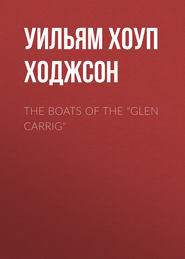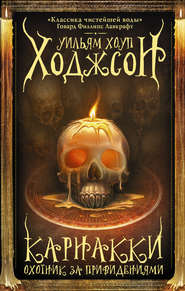По всем вопросам обращайтесь на: info@litportal.ru
(©) 2003-2024.
✖
Carnacki, the Ghost Finder
Настройки чтения
Размер шрифта
Высота строк
Поля
"To give you a root idea, however, it is held in the Sigsand MS. that a child 'stillborn' is 'Snatyched back bye thee Haggs.' This is crude; but may yet contain an elemental truth. Yet, before I make this clearer, let me tell you a thought that has often been made. It may be that physical birth is but a secondary process; and that prior to the possibility, the Mother Spirit searches for, until it finds, the small Element—the primal Ego or child's soul. It may be that a certain waywardness would cause such to strive to evade capture by the Mother Spirit. It may have been such a thing as this, that I saw. I have always tried to think so; but it is impossible to ignore the sense of repulsion that I felt when the unseen Woman went past me. This repulsion carries forward the idea suggested in the Sigsand MS., that a stillborn child is thus, because its ego or spirit has been snatched back by the 'Hags.' In other words, by certain of the Monstrosities of the Outer Circle. The thought is inconceivably terrible, and probably the more so because it is so fragmentary. It leaves us with the conception of a child's soul adrift half-way between two lives, and running through Eternity from Something incredible and inconceivable (because not understood) to our senses.
"The thing is beyond further discussion; for it is futile to attempt to discuss a thing, to any purpose, of which one has a knowledge so fragmentary as this. There is one thought, which is often mine. Perhaps there is a Mother Spirit—"
"And the well?" said Arkwright. "How did the captain get in from the other side?"
"As I said before," answered Carnacki. "The side walls of the well did not reach to the bottom; so that you had only to dip down into the water, and come up again on the other side of the wall, under the cellar floor, and so climb into the passage. Of course, the water was the same height on both sides of the walls. Don't ask me who made the well entrance or the little stairway; for I don't know. The house was very old, as I have told you; and that sort of thing was useful in the old days."
"And the Child," I said, coming back to the thing which chiefly interested me. "You would say that the birth must have occurred in that house; and in this way, one might suppose that the house to have become en rapport, if I can use the word in that way, with the Forces that produced the tragedy?"
"Yes," replied Carnacki. "This is, supposing we take the suggestion of the Sigsand MS., to account for the phenomenon."
"There may be other houses—" I began.
"There are," said Carnacki; and stood up.
"Out you go," he said, genially, using the recognized formula. And in five minutes we were on the Embankment, going thoughtfully to our various homes.
No. 6—THE THING INVISIBLE
Carnacki had just returned to Cheyne Walk, Chelsea. I was aware of this interesting fact by reason of the curt and quaintly worded postcard which I was rereading, and by which I was requested to present myself at his house not later than seven o'clock on that evening. Mr. Carnacki had, as I and the others of his strictly limited circle of friends knew, been away in Kent for the past three weeks; but beyond that, we had no knowledge. Carnacki was genially secretive and curt, and spoke only when he was ready to speak. When this stage arrived, I and his three other friends—Jessop, Arkright, and Taylor—would receive a card or a wire, asking us to call. Not one of us ever willingly missed, for after a thoroughly sensible little dinner Carnacki would snuggle down into his big armchair, light his pipe, and wait whilst we arranged ourselves comfortably in our accustomed seats and nooks. Then he would begin to talk.
Upon this particular night I was the first to arrive and found Carnacki sitting, quietly smoking over a paper. He stood up, shook me firmly by the hand, pointed to a chair, and sat down again, never having uttered a word.
For my part, I said nothing either. I knew the man too well to bother him with questions or the weather, and so took a seat and a cigarette. Presently the three others turned up and after that we spent a comfortable and busy hour at dinner.
Dinner over, Carnacki snugged himself down into his great chair, as I have said was his habit, filled his pipe and puffed for awhile, his gaze directed thoughtfully at the fire. The rest of us, if I may so express it, made ourselves cozy, each after his own particular manner. A minute or so later Carnacki began to speak, ignoring any preliminary remarks, and going straight to the subject of the story we knew he had to tell:
"I have just come back from Sir Alfred Jarnock's place at Burtontree, in South Kent," he began, without removing his gaze from the fire. "Most extraordinary things have been happening down there lately and Mr. George Jarnock, the eldest son, wired to ask me to run over and see whether I could help to clear matters up a bit. I went.
"When I got there, I found that they have an old Chapel attached to the castle which has had quite a distinguished reputation for being what is popularly termed 'haunted.' They have been rather proud of this, as I managed to discover, until quite lately when something very disagreeable occurred, which served to remind them that family ghosts are not always content, as I might say, to remain purely ornamental.
"It sounds almost laughable, I know, to hear of a long-respected supernatural phenomenon growing unexpectedly dangerous; and in this case, the tale of the haunting was considered as little more than an old myth, except after nightfall, when possibly it became more plausible seeming.
"But however this may be, there is no doubt at all but that what I might term the Haunting Essence which lived in the place, had become suddenly dangerous—deadly dangerous too, the old butler being nearly stabbed to death one night in the Chapel, with a peculiar old dagger.
"It is, in fact, this dagger which is popularly supposed to 'haunt' the Chapel. At least, there has been always a story handed down in the family that this dagger would attack any enemy who should dare to venture into the Chapel, after nightfall. But, of course, this had been taken with just about the same amount of seriousness that people take most ghost tales, and that is not usually of a worryingly real nature. I mean that most people never quite know how much or how little they believe of matters ab-human or ab-normal, and generally they never have an opportunity to learn. And, indeed, as you are all aware, I am as big a skeptic concerning the truth of ghost tales as any man you are likely to meet; only I am what I might term an unprejudiced skeptic. I am not given to either believing or disbelieving things 'on principle,' as I have found many idiots prone to be, and what is more, some of them not ashamed to boast of the insane fact. I view all reported 'hauntings' as unproven until I have examined into them, and I am bound to admit that ninety-nine cases in a hundred turn out to be sheer bosh and fancy. But the hundredth! Well, if it were not for the hundredth, I should have few stories to tell you—eh?
"Of course, after the attack on the butler, it became evident that there was at least 'something' in the old story concerning the dagger, and I found everyone in a half belief that the queer old weapon did really strike the butler, either by the aid of some inherent force, which I found them peculiarly unable to explain, or else in the hand of some invisible thing or monster of the Outer World!
"From considerable experience, I knew that it was much more likely that the butler had been 'knifed' by some vicious and quite material human!
"Naturally, the first thing to do, was to test this probability of human agency, and I set to work to make a pretty drastic examination of the people who knew most about the tragedy.
"The result of this examination, both pleased and surprised me, for it left me with very good reasons for belief that I had come upon one of those extraordinary rare 'true manifestations' of the extrusion of a Force from the Outside. In more popular phraseology—a genuine case of haunting.
"These are the facts: On the previous Sunday evening but one, Sir Alfred Jarnock's household had attended family service, as usual, in the Chapel. You see, the Rector goes over to officiate twice each Sunday, after concluding his duties at the public Church about three miles away.
"At the end of the service in the Chapel, Sir Alfred Jarnock, his son Mr. George Jarnock, and the Rector had stood for a couple of minutes, talking, whilst old Bellett the butler went 'round, putting out the candles.
"Suddenly, the Rector remembered that he had left his small prayer book on the Communion table in the morning; he turned, and asked the butler to get it for him before he blew out the chancel candles.
"Now I have particularly called your attention to this because it is important in that it provides witnesses in a most fortunate manner at an extraordinary moment. You see, the Rector's turning to speak to Bellett had naturally caused both Sir Alfred Jarnock and his son to glance in the direction of the butler, and it was at this identical instant and whilst all three were looking at him, that the old butler was stabbed—there, full in the candlelight, before their eyes.
"I took the opportunity to call early upon the Rector, after I had questioned Mr. George Jarnock, who replied to my queries in place of Sir Alfred Jarnock, for the older man was in a nervous and shaken condition as a result of the happening, and his son wished him to avoid dwelling upon the scene as much as possible.
"The Rector's version was clear and vivid, and he had evidently received the astonishment of his life. He pictured to me the whole affair—Bellett, up at the chancel gate, going for the prayer book, and absolutely alone; and then the blow, out of the Void, he described it; and the force prodigious—the old man being driven headlong into the body of the Chapel. Like the kick of a great horse, the Rector said, his benevolent old eyes bright and intense with the effort he had actually witnessed, in defiance of all that he had hitherto believed.
"When I left him, he went back to the writing which he had put aside when I appeared. I feel sure that he was developing the first unorthodox sermon that he had ever evolved. He was a dear old chap, and I should certainly like to have heard it.
"The last man I visited was the butler. He was, of course, in a frightfully weak and shaken condition, but he could tell me nothing that did not point to there being a Power abroad in the Chapel. He told the same tale, in every minute particle, that I had learned from the others. He had been just going up to put out the altar candles and fetch the Rector's book, when something struck him an enormous blow high up on the left breast and he was driven headlong into the aisle.
"Examination had shown that he had been stabbed by the dagger—of which I will tell you more in a moment—that hung always above the altar. The weapon had entered, fortunately some inches above the heart, just under the collarbone, which had been broken by the stupendous force of the blow, the dagger itself being driven clean through the body, and out through the scapula behind.
"The poor old fellow could not talk much, and I soon left him; but what he had told me was sufficient to make it unmistakable that no living person had been within yards of him when he was attacked; and, as I knew, this fact was verified by three capable and responsible witnesses, independent of Bellett himself.
"The thing now was to search the Chapel, which is small and extremely old. It is very massively built, and entered through only one door, which leads out of the castle itself, and the key of which is kept by Sir Alfred Jarnock, the butler having no duplicate.
"The shape of the Chapel is oblong, and the altar is railed off after the usual fashion. There are two tombs in the body of the place; but none in the chancel, which is bare, except for the tall candlesticks, and the chancel rail, beyond which is the undraped altar of solid marble, upon which stand four small candlesticks, two at each end.
"Above the altar hangs the 'waeful dagger,' as I had learned it was named. I fancy the term has been taken from an old vellum, which describes the dagger and its supposed abnormal properties. I took the dagger down, and examined it minutely and with method. The blade is ten inches long, two inches broad at the base, and tapering to a rounded but sharp point, rather peculiar. It is double-edged.
"The metal sheath is curious for having a crosspiece, which, taken with the fact that the sheath itself is continued three parts up the hilt of the dagger (in a most inconvenient fashion), gives it the appearance of a cross. That this is not unintentional is shown by an engraving of the Christ crucified upon one side, whilst upon the other, in Latin, is the inscription: 'Vengeance is Mine, I will Repay.' A quaint and rather terrible conjunction of ideas. Upon the blade of the dagger is graven in old English capitals: I WATCH. I STRIKE. On the butt of the hilt there is carved deeply a Pentacle.
"This is a pretty accurate description of the peculiar old weapon that has had the curious and uncomfortable reputation of being able (either of its own accord or in the hand of something invisible) to strike murderously any enemy of the Jarnock family who may chance to enter the Chapel after nightfall. I may tell you here and now, that before I left, I had very good reason to put certain doubts behind me; for I tested the deadliness of the thing myself.
"As you know, however, at this point of my investigation, I was still at that stage where I considered the existence of a supernatural Force unproven. In the meanwhile, I treated the Chapel drastically, sounding and scrutinizing the walls and floor, dealing with them almost foot by foot, and particularly examining the two tombs.
"At the end of this search, I had in a ladder, and made a close survey of the groined roof. I passed three days in this fashion, and by the evening of the third day I had proved to my entire satisfaction that there is no place in the whole of that Chapel where any living being could have hidden, and also that the only way of ingress and egress to and from the Chapel is through the doorway which leads into the castle, the door of which was always kept locked, and the key kept by Sir Alfred Jarnock himself, as I have told you. I mean, of course, that this doorway is the only entrance practicable to material people.
"Yes, as you will see, even had I discovered some other opening, secret or otherwise, it would not have helped at all to explain the mystery of the incredible attack, in a normal fashion. For the butler, as you know, was struck in full sight of the Rector, Sir Jarnock and his son. And old Bellett himself knew that no living person had touched him.... 'Out of the Void,' the Rector had described the inhumanly brutal attack. 'Out of the Void!' A strange feeling it gives one—eh?
"And this is the thing that I had been called in to bottom!
"After considerable thought, I decided on a plan of action. I proposed to Sir Alfred Jarnock that I should spend a night in the Chapel, and keep a constant watch upon the dagger. But to this, the old knight—a little, wizened, nervous man—would not listen for a moment. He, at least, I felt assured had no doubt of the reality of some dangerous supernatural Force a roam at night in the Chapel. He informed me that it had been his habit every evening to lock the Chapel door, so that no one might foolishly or heedlessly run the risk of any peril that it might hold at night, and that he could not allow me to attempt such a thing after what had happened to the butler.
"I could see that Sir Alfred Jarnock was very much in earnest, and would evidently have held himself to blame had he allowed me to make the experiment and any harm come to me; so I said nothing in argument; and presently, pleading the fatigue of his years and health, he said goodnight, and left me; having given me the impression of being a polite but rather superstitious, old gentleman.
"That night, however, whilst I was undressing, I saw how I might achieve the thing I wished, and be able to enter the Chapel after dark, without making Sir Alfred Jarnock nervous. On the morrow, when I borrowed the key, I would take an impression, and have a duplicate made. Then, with my private key, I could do just what I liked.
"In the morning I carried out my idea. I borrowed the key, as I wanted to take a photograph of the chancel by daylight. When I had done this I locked up the Chapel and handed the key to Sir Alfred Jarnock, having first taken an impression in soap. I had brought out the exposed plate—in its slide—with me; but the camera I had left exactly as it was, as I wanted to take a second photograph of the chancel that night, from the same position.
"I took the dark slide into Burtontree, also the cake of soap with the impress. The soap I left with the local ironmonger, who was something of a locksmith and promised to let me have my duplicate, finished, if I would call in two hours. This I did, having in the meanwhile found out a photographer where I developed the plate, and left it to dry, telling him I would call next day. At the end of the two hours I went for my key and found it ready, much to my satisfaction. Then I returned to the castle.
"After dinner that evening, I played billiards with young Jarnock for a couple of hours. Then I had a cup of coffee and went off to my room, telling him I was feeling awfully tired. He nodded and told me he felt the same way. I was glad, for I wanted the house to settle as soon as possible.
"I locked the door of my room, then from under the bed—where I had hidden them earlier in the evening—I drew out several fine pieces of plate armor, which I had removed from the armory. There was also a shirt of chain mail, with a sort of quilted hood of mail to go over the head.
"I buckled on the plate armor, and found it extraordinarily uncomfortable, and over all I drew on the chain mail. I know nothing about armor, but from what I have learned since, I must have put on parts of two suits. Anyway, I felt beastly, clamped and clumsy and unable to move my arms and legs naturally. But I knew that the thing I was thinking of doing called for some sort of protection for my body. Over the armor I pulled on my dressing gown and shoved my revolver into one of the side pockets—and my repeating flash-light into the other. My dark lantern I carried in my hand.













